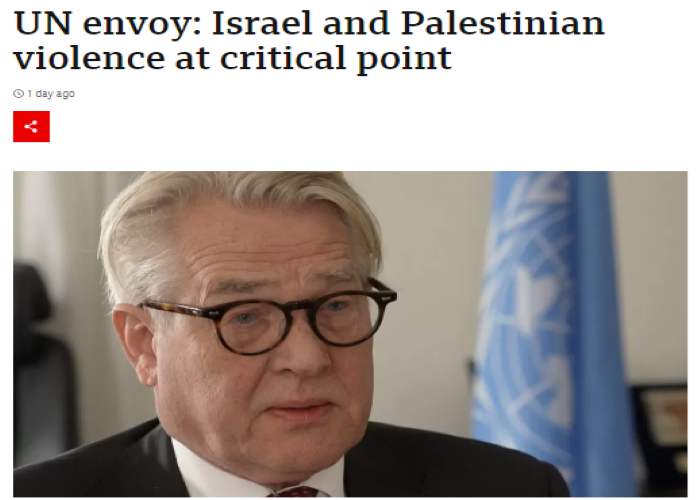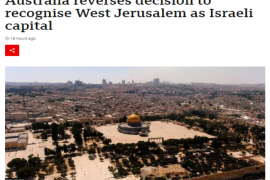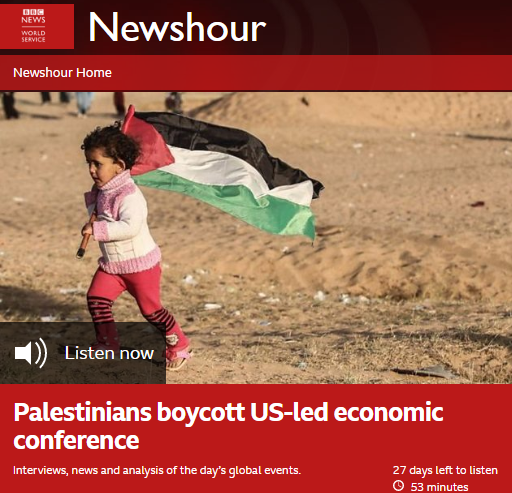Previously we discussed three articles written by some of the journalists tasked with making sure that BBC audiences are up to date with what is going on in the Israel-Palestinian arena, noting how serial omissions in their reporting compromise audience understanding:
BBC NEWS CONTINUES TO PRESENT A PARTIAL PICTURE OF TERROR IN JENIN
BBC REPORTS ON BLINKEN VISIT PROMOTE A FACILE NARRATIVE
Since the beginning of February the BBC News website has published two more items in the same vein, both attributed to the BBC Jerusalem bureau’s Tom Bateman and both including many of the same serial omissions.
February 1st saw the appearance of a third report on the topic of the US Secretary of State’s recent visit to the Middle East under the headline ‘Israel and the Palestinians: Blinken’s Jerusalem visit offers few solutions’.
In that report Bateman begins by telling readers that there are several “pivotal moments” that have led to increase tensions in the region:
“It is a long list. First is the accelerating rate of bloodshed. Next comes the most radically nationalist governing coalition in Israel’s history, led by Prime Minister Benjamin Netanyahu (who is on trial on corruption charges, which he denies).
The coalition is asserting “exclusive” Jewish rights to all the land (ie ending any idea of a future independent Palestinian state).”
As in the previous reports on Blinken’s visit, readers are told nothing of the multiple Palestinian factions which likewise claim “exclusive” rights to “all the land” and seek to bring an end to the existing Jewish state and so once again BBC audiences are led to understand that Israel’s new government is the prime factor standing in the way of a two state solution.
Bateman’s brackets binging portrayal goes on:
“Then there is a near complete collapse in control by the Palestinian Authority (PA) in parts of the occupied West Bank (seeing waves of Israeli military raids and helping create a new generation of armed militants), an ageing and unpopular PA leader (who this year marks Year 18 of his four-year elected term in office), and his announcement last week to ditch so-called security co-ordination with the Israelis (a move that could lead to a complete security collapse in the West Bank).”
As in his previous article relating to those issues, Bateman avoids mentioning the increased involvement of Fatah’s Al Aqsa Martyrs Brigades – as well as members of the PA security forces – in the escalating terrorism and violence. His portrayal of Mahmoud Abbas does not include the relevant topic of the ‘succession struggle’ that is already in evidence. Issues such as PA sanctioned glorification of terrorism, incitement and financial support for terror perpetrators are as ever absent from Bateman’s portrayal.
Returning to the “accelerating rate of bloodshed”, Bateman once again uses the ‘chicken and egg’ formula, failing to clarify that counter-terrorism operations by Israeli forces in supposedly PA controlled areas are the outcome of Palestinian terrorism.
“On the first point, the death toll is among the worst in years. In the last 10 months there have been waves of lethal Israeli military search and arrest raids in the occupied West Bank, a deadly round of fighting between Israel and Palestinian militants in Gaza, and a spate of deadly attacks by Palestinians against Israelis. More than 200 Palestinians and 30 Israelis were killed in 2022. In January alone this year, more than 30 Palestinians and seven Israelis have been killed.”
As has been the case in his previous reporting, Bateman fails to clarify that a high proportion of the Palestinians killed in 2022 and January 2023 were terrorists and/or people engaged in violent rioting against Israeli forces whereas the majority of the Israelis killed over the same period of time were civilians.
Towards the end of his report Bateman states:
“Meanwhile in Ramallah a key subject with Palestinian President Mahmoud Abbas will have been calling on him not to follow through on his threat to drop security co-ordination with Israel, a legacy of the breakthrough 1990s Oslo peace agreements.
The system sees PA security forces stepping aside when the Israeli army raids Palestinian cities. It is deeply unpopular with many ordinary Palestinians and Mr Abbas has repeatedly threatened to ditch it in the past but only rarely ever got close to that. By Monday it already looked like he was backing down, reportedly saying it was “only partially suspended”.”
Bateman did not bother to inform readers that under the terms of the Oslo Accords, the PA security forces have clear obligations to act against terror and violence:
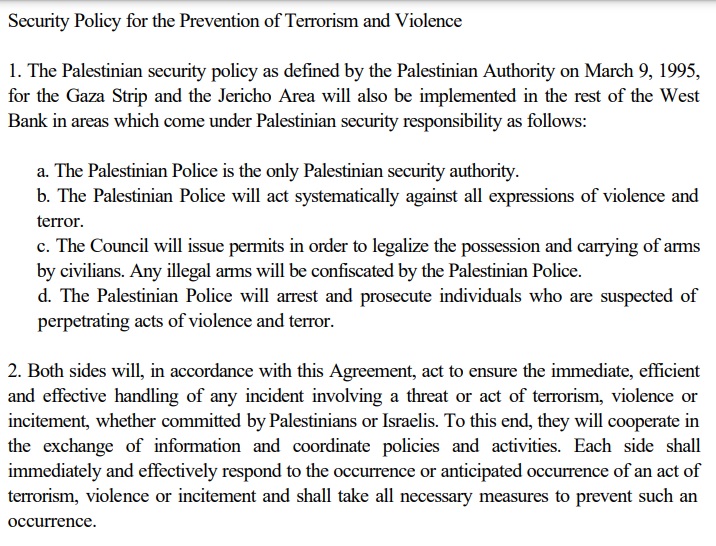
On February 3rd the BBC News website published another report by Bateman titled ‘UN envoy: Israel and Palestinian violence at critical point’ in which Bateman once again fails to clarify that the majority of Palestinians killed since the beginning of the year were terrorists and/or males engaged in violence, while all the Israelis killed in that time period were civilians. Once again he places “Israeli military search and arrest raids” before the “Palestinian attacks” which prompted those counter-terrorism operations: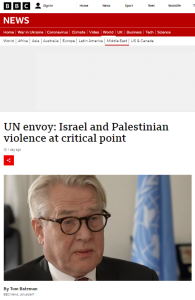
“In the last month, more than 35 Palestinians and seven Israelis have been killed, following a year of spiralling violence involving near-nightly Israeli military search and arrest raids and a spate of Palestinian attacks.”
Yet again Bateman erases the topic of Palestinian approaches to “rights to all the land” but tells readers that:
“It comes with the most radically nationalist government in Israel’s history now in power, which has declared the principle of “exclusive” Jewish rights to all the land.”
And once again he fails to note the full range of factors – including Hamas incitement and funding for terrorism and gun smuggling by Iranian linked regional actors – that have contributed to the rise in violence in PA controlled areas.
“Meanwhile, a crisis-gripped PA, which governs to a limited extent parts of the West Bank, has been losing control of the cities of Jenin and Nablus to a new generation of armed militants.”
Relating to the previous US administration’s ‘Peace to Prosperity’ proposal, Bateman tells readers that:
“International efforts towards a long-term solution have been stalled for nearly a decade. The Trump administration put forward a plan, now abandoned, which would have seen Palestinians given municipal control of pockets of the West Bank along with the Gaza Strip, with Israel given full security control.
The fallout from the plan’s announcement sparked violence on the ground and saw the Palestinians cut off nearly all ties with the US.”
In fact, the Palestinians had already cut ties with the US administration before the proposal that they rejected without reading was published.
Bateman goes on to give uncritical amplification to the talking points of anonymous “human rights groups” without providing any explanation of what lies behind promotion of the so-called “one-state solution”.
“Meanwhile, human rights groups increasingly call on the international community to acknowledge a “one-state” reality for Palestinians living under Israel’s military occupation, now into its 56th year.”
His portrayal of his interviewee’s statements on PA funding predictably ignores relevant issues such as corruption and PA prioritisation of financial rewards for terrorism.
“The envoy said stability was also threatened by the worsening situation of the Palestinian Authority, saying some governments who helped fund it had “checked out”.
“There is hardly any money coming in from donors to the PA and that needs to change.
“If you cannot pay salaries to public employees, if you cannot deliver health services, if you cannot buy medicine, if you cannot get the schools [funded], then we are in a very dire situation,” he said, adding that UN funding was already about $1bn (£830m) alone in Gaza, which is controlled by the Palestinian militant group Hamas.”
As we see, the BBC News website published five articles in five days relating to the current security situation and the wider topic of ‘the peace process’ (some of which are repromoted at the bottom of these two latest reports), all of which practically copy/paste the same narratives, themes and talking points and thereby promote partial framing which fails to provide BBC audiences around the world with the full range of information necessary for proper understanding of those topics.
Related Articles:
DOES BBCSPLAINING OF PALESTINIAN ASPIRATIONS STAND UP TO SCRUTINY?

